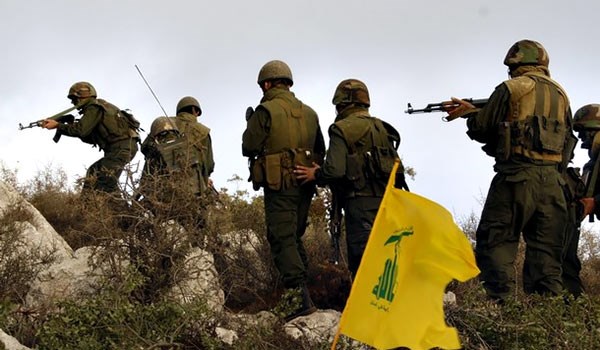
RNA - The Syrian army and resistance forces have regained control of several regions in their operation at the bordering heights with Lebanon. The army and Hezbollah forces, supported by artillery and missile fire, have continued clashes against ISIL in the Southern parts of Western Qalamoun, seizing control of Wadi al-Maqareh Kabir and Wadi al-Maqareh Saqir heights as well as the Ra's al-Shahout passageway from the heights overlooking Syria's town of Qarah to the heights overlooking the town of Arsal in Lebanon. As we speak, they have also captured al-Mahabes, Ako and al-Bahasat hills, and imposed control over the al-Mal and Shobat al-Rad crossings near Faliteh al-Jarajir region.
According to the leader of the Lebanese Hezbollah resistance movement, armed members of the ISIL Takfiri terrorist group are now under siege over an area of about 60 square kilometers, after scores of them were killed by resistance fighters in the past few days. Seyed Hassan Nasrallah says the main goals of anti-ISIL operations include to secure Lebanon’s border with Syria. That’s beside the point:
With all eyes on Iraq and Syria, a less conspicuous but potentially just as explosive front line with the terrorists has emerged in Lebanon, where Lebanese soldiers and Hezbollah fighters are increasingly pulled into deadly fighting with the ISIL militants along the country's border with Syria. This has sent shockwaves across the Mediterranean country, eliciting fear of a potential slide into the kind of militant, sectarian violence afflicting both Syria and Iraq, and increasingly prompting minorities to take up arms. After all, this is what ISIL and its patrons want.
ISIL does not hold territory in Lebanon. But along with Syria's Al-Qaeda affiliate, the Nusra Front, it has established footholds in remote mountains along Lebanon's remote eastern border, from where it launches almost daily incursions further afield. ISIL recruitment in impoverished Sunni areas of northern Lebanon is also visible, with black flags flying freely in some areas, reflecting pockets of growing presence of the radical group.
Under International Law and protocols, this justifies Hezbollah's narrative that its intervention in Syria is necessary to ward off an ISIL threat to Lebanon. Paradoxically, it has brought Hezbollah closer to Christians and other Lebanese minorities through their shared hate toward the ISIL militants. In addition to fighting ISIL in Syria, Hezbollah is also embroiled in clashes inside Lebanon.
As a consequence, Hezbollah has entered a battle that is bigger than Lebanon and it has to win it one way or another. Today, Hezbollah is obliged to continue in the battle both for the sake of Lebanon’s security and that of Syria, its close ally - along with Iran and Russia. Such policy not only erodes the stature of ISIL and Nusra Front, it shows the terrorist groups to be vulnerable. In the coming days and weeks, or as the months go by, we are going to see more and more victories for Hezbollah.
As maintained by the Hezbollah leader, at present the remnants of ISIL terrorists are surrounded over an area of 60 square kilometers, including 20 square kilometers on the Lebanese side and 40 square kilometers on the Syrian side of the border. Some 100 square kilometers of land previously under ISIL control have been liberated and only 20 square kilometers are still under terrorists' control.
As is customary, the terrorists are using civilians as human shields there, which slows down Hezbollah’s operations. The terrorists have also extended a proposal for negotiation only as a way to get out of their current predicament. They have asked Hezbollah to let them withdraw from the border region to Deir Ezzur province in Syria.
All in all, ISIL goals in Lebanon to occupy land and stoke sectarian violence is just a wish, without a definite, clear and practical victory. It comes from the egos of its patrons as well. They no longer have the upper hand in the region, much less along the Syrian-Lebanese border.
History shows us that foreign-sponsored militancy, invasions and occupations are always defeated. History also tells us that the resistance movement has beaten Israeli invaders several times before. That would spell the final chapter in the American ISIL experiment in the Middle East. The futile efforts made by the War Party in Washington who advocate a doctrine of permanent war, as well as their terror proxies and client states who try to intimidate and contain regional rivals and preserve the post-colonial status quo, won’t change the course of actions along the Syrian-Lebanese border.
The point in all this is that like Washington's, the position of ISIL and its patrons has become feeble in Lebanon. They all feel isolated, paralyzed, humiliated and insecure on all levels. They are only defeating themselves, as they cannot defeat Hezbollah. If history is a witness, the resistance movement which has accomplished great things in the Real War on Terror has great aims too. Hezbollah fighters have fixed their gaze on goals that are lawful, humanitarian, positive, and high. Quite the opposite, ISIL’s goals to stoke sectarian violence and occupy territory in Lebanon will go nowhere. Behind the clouds, they are just wishes.
847/940